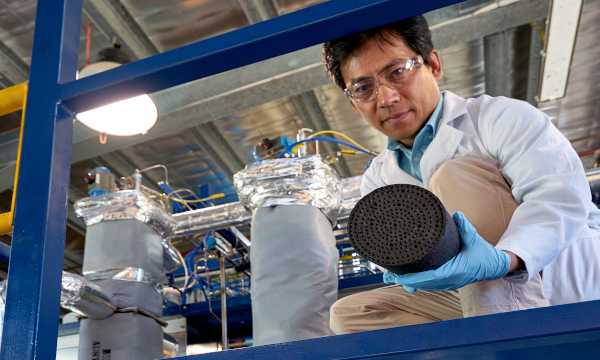The challenge
Variability among coals
Coal is a unique resource and its composition varies depending on the peat, plant or algae from which it was formed and the heat, time and pressure to which it has been exposed.
This means coals can behave very differently to each other at each step of the mining process.
Existing bulk coal characterisation techniques did not provide sufficient data needed for efficient exploration, processing, transportation and utilisation of coal.
This lack of information resulted in inefficiencies and other problems for explorers, miners and steel makers.
Petrography – the study of the microscopic properties of coal and other resources – can help inform the best way to handle it at each step in the value chain: exploration, mining, processing, transport and use.
However, traditional manual microscopic examination takes a long time, requires a highly trained person and still gives limited data.
Our response
Bringing petrography into the 21st century
Our Component Grain Analysis (CGA) technology has made petrographic sample analysis faster and more detailed, using an automated microscopic imaging and image-analysis system.
CGA’s automated optical reflected-light microscopy imaging system measures the composition of the target material’s grains and produces reliable grain-by-grain characterisation data, as well as detailed images.
The system collects some 1000-2000 calibrated high-resolution colour images of a sample to produce a mosaicked image, which the CGA software processes and converts to size and composition information for every particle.
The accuracy and repeatability of measurements is improved by algorithmic analysis (rather than the unavoidable subjectivity of even the most expert human analysts).
The detailed data on a coal and its particles improves decision-making at all steps in the value chain, including:
- deciding how best to grind and blend coals to make coke for steel making
- determining if a coal can be processed differently to better remove impurities, and
- discerning if a selective mining strategy would require less processing and produce a better quality coal.
The results
Putting particulate knowledge to work
CGA was developed for the analysis of coal samples and has since been licensed to both Australian and international laboratories being a vital tool in the coal industry.
For miners, reliable knowledge of the quality and quantity of saleable coal can make the difference between the success or failure of a $1B investment.
For steel makers, reliable knowledge of the quality of their coking coal can increase the efficiency and effectiveness of its use.
The CGA system has worked so well for coal that we are now exploring its use in environmental and other commodity samples.
CGA technology is now being extended to analyse environmental samples, such as dust and sediments, and other types of particulate samples.
Component grain analysis of urban dust in communities near ports, mines and rail corridors is being used to identify whether the source of the dust was coal mining, farming or other activities.
This detailed information can help governments and industry establish environmental practices and policies to protect communities from air pollution, so it’s vital that it is accurate and consistent.
The Australian Coal Association Research Program (ACARP) recognised the importance of this technology by presenting CSIRO’s project team with two industry excellence awards, the most recent in 2018.
Along with our commercialisation efforts, the CSIRO CGA team offers limited in-house commercial laboratory and consulting services.

